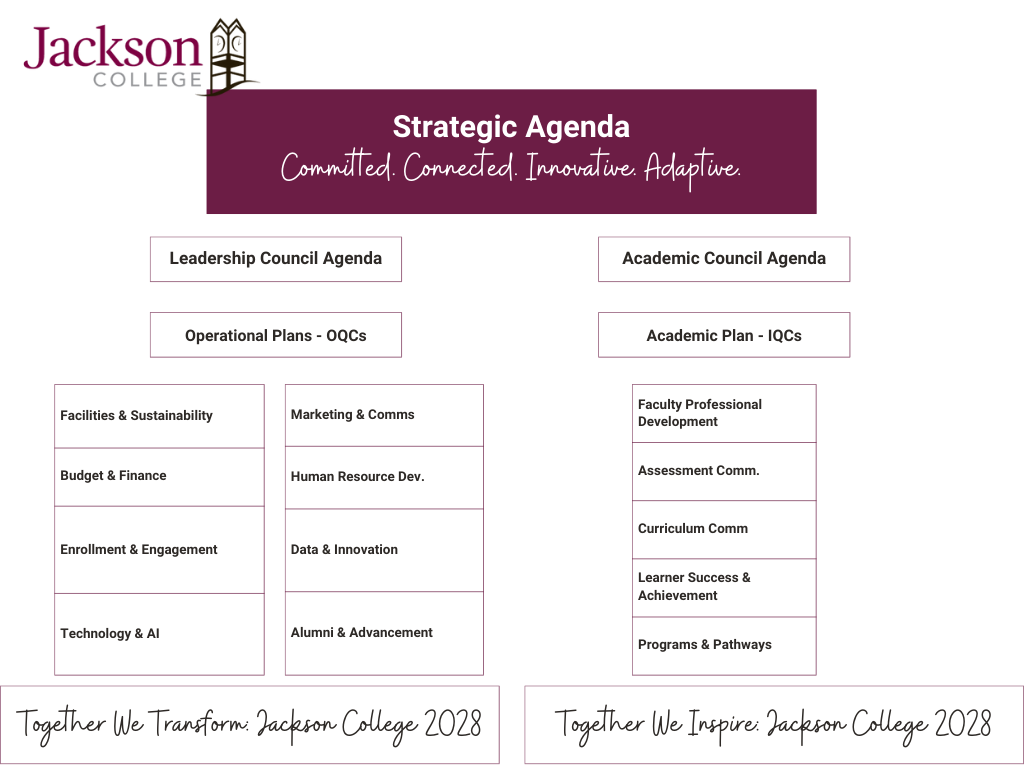Empowering Campus Stakeholders Through Strategic Planning

Strategic planning serves as a cornerstone for institutional success, providing a clear road map that aligns organizational goals with the needs of the local community. In today’s dynamic educational landscape, the involvement of employees and stakeholders is critical, as their insights and contributions foster a sense of ownership and accountability. Empowering campus stakeholders through inclusive processes not only enhances engagement but also cultivates a culture of collaboration and innovation. By prioritizing open dialogue and collective input, institutions can create a strategic agenda that resonates with all members, driving commitment to shared objectives and, ultimately, enriching the educational experience for everyone involved.
Strategic planning at Jackson College transcends mere goal setting; it is a vital opportunity to engage and empower our campus community. Central to this initiative is a structured approach that utilizes both Instructional Quality Committees (IQCs) and Operational Quality Committees (OQCs) to ensure that our academic and administrative functions work in concert toward achieving institutional goals. These committees are the backbone of our collaborative framework, designed to foster deep engagement and drive effective planning throughout the institution.
The Strategy Behind Our Agenda
At Jackson College, we have adopted a strategic agenda rather than a traditional strategic plan that spans three to five years. The agenda is designed to be a living, or evergreen, document that adapts to the evolving needs of the institution. We review it quarterly, providing updates on achieved, completed, and in-progress efforts. This dynamic approach allows us to amend the agenda as necessary based on shifts in institutional priorities or other pertinent changes. By maintaining flexibility, we ensure that our goals and priorities remain relevant and responsive to the campus community. This fluidity is essential for a community college, allowing us to pivot quickly in response to workforce needs, student demographics, and broader educational trends.
A Transformative Approach to Shared Ownership
In recent years, Jackson College has embraced a transformative approach to strategic planning by actively involving colleagues from across campus. This initiative has been facilitated through listening sessions between the Leadership Council and their respective reporting divisions, creating a platform for open dialogue about our goals and priorities. The college’s inclusive approach led to the creation of four holistic and mission-driven goals—committed, connected, innovative, and adaptive—which reflect our aspirations and serve as a foundation for our strategic priorities. Our approach in the past was one in which individual Leadership Council members were solely responsible for prioritizing and executing tactics. Now, we empower our entire campus community through openness and collaboration. Everyone at Jackson College has clear visibility into our priorities and is encouraged to contribute tactics that align with our institutional goals. This inclusive method not only strengthens our strategic agenda but also builds a deep, shared commitment to our mission. Beyond individual contributions, a robust committee structure provides the essential foundation for turning these tactics into action.

Committee Structure and Roles: Fostering Engagement and Cohesion
The creation and implementation of IQCs and OQCs have been pivotal in transforming Jackson College’s strategic planning process. These committees are not simply advisory bodies; they are active participants in shaping the institution's future by directly fostering engagement and ownership.
The IQCs focus on the academic side and play an essential role in establishing our academic master plan. These committees are comprised of faculty, academic deans, and other academic leaders, ensuring that diverse perspectives are brought to the table. They are tasked with reviewing and refining departmental operational plans, including essential components like learner success and achievement, program review, faculty professional development, assessment of learning, and curriculum. Their work directly aligns with our mission and strategic objectives, with a strong emphasis on academic quality and operational efficiency. Through regular meetings and discussions, IQCs facilitate cross-departmental collaboration, break down silos, and ensure that academic initiatives are cohesive and strategically aligned. This direct involvement empowers faculty to shape the educational experience and fosters a shared commitment to student success.
Conversely, the OQCs address the administrative side by overseeing the implementation of operational plans that support the institution's broader goals. These committees consist of staff from various administrative departments, including facilities, finance, human resources, and student services. OQCs are responsible for developing and reviewing operational policies, resource allocation strategies, and performance metrics. Their work ensures that the infrastructure and support systems of the college are robust and directly contribute to the college’s strategic agenda. For example, an OQC might focus on streamlining student orientation processes, optimizing facilities usage, or enhancing cybersecurity measures. By bringing together individuals from different operational areas, OQCs promote a holistic understanding of institutional challenges and opportunities, leading to more integrated and effective solutions.
Together, these committees not only enhance departmental performance but also contribute to the overall achievement of our strategic agenda. To maintain momentum and ensure continuous progress, we convene monthly meetings with groups aligned with our four strategic goals. These gatherings are designed to facilitate progress, communication, and accountability across all committees. This layered approach to committee oversight ensures that strategic initiatives are continually reviewed, adjusted, and celebrated, thus reinforcing a cycle of continuous improvement and broad-based engagement.
Impact of Engagement and Cultivating a Collaborative Environment
Feedback from the campus community indicates a significant shift in engagement levels. There is a growing sentiment that more employees are aware of the strategic agenda and feel empowered to align their daily work with it. The agenda now serves as a guiding framework for decision-making, influencing new initiatives and becoming a living document that shapes our operations and culture. The simplified format of the agenda enhances accessibility, allowing employees at all levels to connect with it meaningfully. Research underscores the importance of involving employees in the strategic planning process, as their engagement fosters a sense of ownership and value, ultimately enhancing motivation and commitment to institutional goals (Falqueto et al., 2019).
By engaging stakeholders in this collaborative process, we have created an environment that values unique perspectives and innovative ideas. This evolution aligns with the literature on stakeholder management, which emphasizes the importance of continuous engagement and the integration of multiple stakeholder objectives (Falqueto et al., 2019). As we continue this journey, our commitment to fostering open communication and collaboration remains steadfast. By creating space for every voice to be heard, we strengthen the strategic planning process and empower campus stakeholders to contribute actively to our shared mission.
The collective ownership of our strategic agenda has resulted in greater unity within our community, propelling the institution forward with a common set of goals. By empowering our stakeholders, we not only strengthen the fabric of Jackson College but also create a culture where everyone feels invested in our shared success.
Takeaways for Community College Leaders
As community college leaders reflect on their own strategic planning processes, several key takeaways emerge from Jackson College's experience. First, consider adopting a living strategic agenda rather than a static multi-year plan. This approach allows for flexibility and responsiveness to changing institutional priorities, ensuring that the agenda remains relevant and actionable. Second, prioritize inclusive engagement by actively involving staff at all levels in the planning process, particularly through the establishment of dedicated committees like our IQCs and OQCs. Hosting listening sessions and encouraging input from diverse teams can foster a culture of collaboration and ownership, ultimately enhancing motivation and commitment to shared goals. Finally, maintain a regular review process to assess progress and recalibrate tactics as needed. Quarterly evaluations not only keep the strategic agenda dynamic but also provide opportunities for celebration and recognition of achievements, reinforcing a sense of community and shared purpose among stakeholders.
Framework Summary
The strategic planning framework at Jackson College is more than a series of goals: It represents a commitment to inclusivity, collaboration, and continuous growth. By actively engaging our campus community through committees, we are cultivating an environment that fosters innovation and adaptability, ensuring that Jackson College remains a dynamic institution poised for success in a rapidly changing educational landscape.
Reference
Falqueto, J. M. Z., Hoffmann, V. E., Gomes, R. C., & Mori, S. S. O. (2019). Strategic planning in higher education institutions: What are the stakeholders' roles in the process? Higher Education Studies, 9(4), 1039-1056.
Ashley Van Heest, M.Ed., is Chief Strategy and Institutional Research Officer at Jackson College in Jackson, Michigan.
Opinions expressed in Leadership Abstracts are those of the author(s) and do not necessarily reflect those of the League for Innovation in the Community College.










